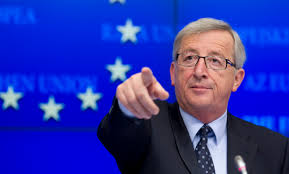EU Commission chief Jean-Claude Juncker unveiled major plans Wednesday to force the bloc to share 160,000 refugees and ease the pressure on border states from the worst migration crisis since World War II.
EU Commission chief Jean-Claude Juncker unveiled major plans Wednesday to force the bloc to share 160,000 refugees and ease the pressure on border states from the worst migration crisis since World War II.
With Greece and Hungary struggling to cope, Juncker urged Europe to look to its history and not be afraid of his "bold" proposals for compulsory quotas for refugees fleeing conflict in Syria and elsewhere.
 But German Chancellor Angela Merkel -- whose country expects 800,000 asylum claims this year and has said it could take half a million annually over several years -- urged Europe to go further, claiming binding quotas were the only way to ensure a "fair" and proportionate sharing of the burden.
But German Chancellor Angela Merkel -- whose country expects 800,000 asylum claims this year and has said it could take half a million annually over several years -- urged Europe to go further, claiming binding quotas were the only way to ensure a "fair" and proportionate sharing of the burden.
The migrants' plight has touched hearts around the world, spurred especially by pictures last week of three-year-old Syrian Aylan Kurdi, whose lifeless body washed up on a Turkish beach.
In response to appeals for help from an increasingly-strained Europe, Australia said it would take an additional 12,000 refugees from the Syria and Iraq conflicts and several South American countries also agreed to help.
"Now is not the time to take fright, it is time for bold, determined action for the European Union," Juncker said in his first EU State of the Union speech to the European Parliament in Strasbourg.
But he also warned member states against making religious distinctions when deciding to admit refugees.
Mandatory quotas have faced stiff opposition, especially from eastern EU states such as Hungary, which is on the front line of Europe's largest migrant wave in 70 years.
"We need a binding agreement on the binding distribution of refugees according to fair criteria between member states," Merkel told the German parliament.
"We cannot just fix a ceiling and say I don't care about anything above that."